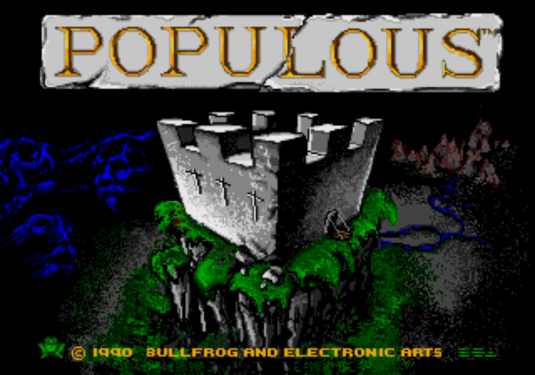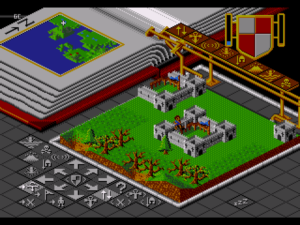
A couple of years later I had scraped enough cash together for Sega's MegaDrive and, well, I think you can guess what an early purchase was. If you're not in the know or too hopelessly young to have even heard of Populous, it is widely recognised as the game that kicked off the God genre. In the base game (expansions were available in short order for the Amiga and ST) you were tasked with 500 worlds to conquer. Your little computer people wander around the isometric map until they find a flat piece of land and build a settlement. You can then raise and lower surrounding land to provide for their farming, which allows the town to become more sophisticated and its inhabitants stronger. Flatten out enough land and it turns into a castle which, eventually, produces harder followers with better weapons. They go and find more land and it begins again. In practice, you're sorting out land and finding dozens of your faithful flock new places to live. Everything is in real time so as you're expanding and flattening your land mass, the AI-controlled opposition is doing exactly the same. As you advance up the levels, they get quicker about it too.
You can command settlers to seek new land, follow your leader (who you can direct with the Ankh, an icon you can play anywhere on the map and instruct the leader (and therefore the people) to go to it. Handy for invasions ...), associate with others before settling to make followers merge and become stronger, and seek out enemies to fight. Battles are always automatic and the outcome relies on a mix of how strong the individual settler is and the weapon they're using. Beware if you've got a strong fella but the enemy are equipped with much better weaponry. They will have your guts for garters.

Each world differs according to what powers are available to you and your opponent. On the first, Genesis, you can do everything and your opponent nothing beyond raising and lowering land and moving their evil icon about. If Armageddon isn't available as an option, be prepared for a very long war of attrition. There are also different terrain types to consider. Grasslands are nice and benign and your followers can stroll about like a flâneuse through a Parisian shopping arcade. The other types are somewhat less forgiving. There are desert worlds, ice worlds, and, um, lava worlds. If at the start of these your folks don't find somewhere to settle they will die and leave you in something of a pickle. You can toughen up settlers by extending their farm land in the normal way, but anyone, no matter how tough, will weaken if they're left dawdling about. The same applies to the enemy deity, but as they tend to be faster they will soon start sending disasters in your folks direction, severely inconveniencing their day.
And that is Populous. A brilliantly original concept at the time, even if - understandably - the AI was quite limited. Don't expect any shrewd moves, it will just go all out to kill you by any and all means. For instance, if the opponent has more manna than you, it will spam disasters on you. If it can flood the world, it will - even if you have built your empire several levels above the sea and the majority of their people are in low lying areas. But hey, it was the 1980s. Because the AI was limited, it does mean games can get quite samey and long-winded. If you have drawn one of the attrition worlds, it can take about four hours to slay every single one of their people and win. Where some skill is involved are the handful of worlds where you cannot raise or lower land. If you are in close proximity with the enemy you have to use your Ankh placing and battle choosing very carefully. A shame there's so few of them in the base game.

As the ground zero of God gaming, all the observations you can make about similar games apply here. The instrumentalist view of your charges, their disposability, the indifference greeting the demise of one settler here, one settler there, the ease with which they can be directed by the four behaviour commandments and, well, the coherence you lend them by being their divine manipulator and commander, it replicates the logics of managerialism, nationalism and religious animosity, albeit reworked in a harmless and safe digital environment. Nevertheless because Populous does reinforce certain habits of mind, which have long since been taken up by turn-based and real time strategy and God games since, Populous is responsible for repackaging and, effectively, training millions of gamers in how to think managerially. It's not alone in doing so, but Populous was a pioneer, and its legacy leaks far beyond the genre it helped usher in.
No comments:
Post a Comment